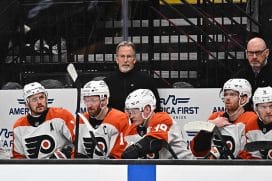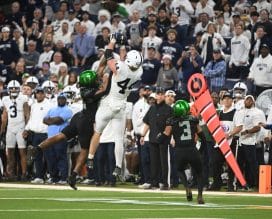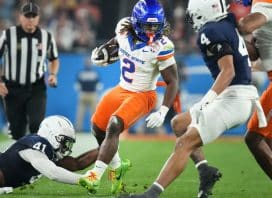Flyers
Around the NHL: Art Ross Non-Race, Berube’s New Blues, Nervousness in Columbus
By Ryan Black, Sports Talk Philly staff writer
The season's home stretch truly is upon us. The contenders are working out the kinks, the middling playoff teams are shuffling themselves around, and those on the fringes, including the Philadelphia Flyers, are hoping — as the cliché goes — that there's enough runway left for them to make the dance.
Every team has between 12 and 14 games remaining, meaning it's impossible to know what the playoff matchups will look like yet. But there's one that seems all but certain: The Toronto Maple Leafs will play the Boston Bruins. The two teams are four points apart in the Atlantic Division, Toronto trailing, but at least 10 points away from first and fourth. Barring a serious losing streak by either, NHL fans will be in for a classic Original Six matchup, the 16th playoff meeting between the two teams in the last 90 years. The Leafs have made the playoffs just three times in the last 13 seasons, losing in the first round each time, two of the three to the Bruins.
That meeting, no matter how historic, classic, and aesthetically pleasing it may be, stirs up fresh criticism for the NHL's current playoff format. Currently, the teams have the second and fourth most points in the entire league, and will both most likely finish in the top third of the 16 teams that make it into the playoffs. While some second-place teams in other divisions will get to pick off mediocre competition, it seems all but certain now that one of the NHL's best regular season teams will be vanquished in the quarterfinals.
The antidote to that, most likely for Leafs fans (if we're making predictions), is just to win the division, right? Well, that's a completely meaningless thought, given who is ahead of them. So, we begin this week's Around the NHL there, down in Florida, on the Gulf side, where…
…the Art Ross Race is Basically Over
The NHL scoring race this season is essentially over. Not only are the Tampa Bay Lightning running away with the President's Trophy en route to one of the best team records in league history, but their own Nikita Kucherov is on pace for one of the best stat lines in more than a decade.
Through 69 games, the 25-year-old Russian winger has potted 33 goals and added 77 assists. Those 110 points already beat out the last eight Art Ross trophy winners, and if he holds onto his 131-point pace he'd be the first to touch that total since Mario Lemieux compiled an astounding 160 points in 1995-96.
Even 120 points, which Kucherov will easily hit barring any injury, would be a rare feat in the modern NHL. In the last two decades, only Sidney Crosby (2006-07), Joe Thornton (2005-06), and Jaromir Jagr (2000-02) have eclipsed that marker. Considering we're just four seasons removed from a campaign where the Art Ross was won with just 87 points, Kucherov's season is particularly incredible.
The winger is a bit atypical in the landscape of current NHL superstars. Unlike every other player in the top 5 in scoring this season, and all but two other Art Ross winners (Martin St. Louis and Jamie Benn) since the days of Gretzky, he was not a Top 10 draft pick. Kucherov, a second rounder in 2011, didn't break into the NHL until he was 20, and didn't hit a point-per-game pace until his 23-year-old season in 2016-17. Since that 85-point outing, he put up an even 100 last season before pulling far away from the pack in this year's race. Connor McDavid, who trails Kucherov by 14 points, was one point-per-game-plus guy who broke 100 points at just 19 years old.
Kucherov is still young enough to grow further, but it's difficult to gauge how much higher a player's ceiling can be when their physical abilities are, at almost 26 years old, likely peaking. Kucherov's brilliance is mostly mental, processing the game better than almost anyone else on the ice and consistently finding soft areas of the ice to sink into and disappear. He's a bit like a hyper-charged Daniel Briere, not particularly large or fast, but effortlessly clever and precise. Every shot is a bullet, every pass is pinpoint. While McDavid might dominate with whiz-kid stick work and unmatched speed, Kucherov plays the game as if he's watching it from above — and that style should benefit him and the Lightning for years to come.
Berube's (and Binnington's) Blues
When the St. Louis Blues fired head coach Mike Yeo in November, Flyers fans might've chortled that assistant coach — and former Philadelphia enforcer and head coach — Craig Berube was named as his replacement. The Blues were 7-9-3 at the time, languishing near league bottom. Berube's first 20 games did not go so well, either: The team went 9-10-1.
But in the stretch since then, beginning with a 3-0 win over the Flyers on Jan. 7, the Blues have gone an impressive 20-6-3 and now sit comfortably in third place in the Central Division, five points ahead of the ninth place team in the West. After posting a -19 goal differential through their first 39 games, they've been +29 in the last 31.
Much of the credit should go to rookie netminder Jordan Binnington. Though he made two relief appearances early in the season and one way back in 2015-16, his first official start was that shutout win against the Flyers. He took off from there, posting a 16-3-1 overall record with an incredible .929 save percentage and five shutouts. His shine might be wearing off a bit at the moment — he's just 3-2-0 with .902 in his last five starts — but his nine-game winning streak from late January through the first half of February helped drag the Blues from the basement to a playoff spot.
The incredible turnaround has made Binnington an unlikely Calder Trophy contender, and Berube a candidate for the Jack Adams Award. We won't know whether one is a product of the other, or if the team has collectively captured lightning in a bottle, until perhaps next season, because it seems pretty clear both have cemented their second chances at this point.
The Struggle in Columbus
The Columbus Blue Jackets were the toast of the hockey world two weeks ago when they pulled out all the stops at the Trade Deadline. They added four roster players, at the expense of essentially the next two drafts, in hopes of finally pushing their franchise to its first-ever playoff series win.
But since the first of those trades, their Feb. 22 acquisition of Matt Duchene, the Jackets haven't exactly taken off. They're 5-4-0 in that stretch, including a hardly-encouraging 2-1 shootout victory over an emaciated New Jersey Devils roster (seriously, look at it). Columbus has averaged just a hair over two goals for per game since Duchene, former Ottawa Senators teammate Ryan Dzingel, defenseman Adam McQuaid, and backup goalie Keith Kincaid joined the fold.
The forwards in that group, Duchene and Dzingel, have contributed just a goal and six assists in their 16 combined games so far. McQuaid is more of a stay-at-home defender and isn't really expected to contribute quantifiable stats, but he's played over 15 minutes for John Tortorella just once since his arrival. Kincaid hasn't played yet, but he's there mostly as insurance going into the postseason.
It takes time for players to gel and adjust, and it isn't all too shocking that the Blue Jackets have seen mixed results since making monumental moves. But they don't have too much time to catch their stride, and it's still not a certainty that they make the playoffs. A win this weekend over the Pittsburgh Penguins pushed them back into the final Wild Card spot, just two points ahead of the Montreal Canadiens and five ahead of the Flyers. They're four points out of a top-three spot in the Metropolitan, so unless they can grapple their way into one of those positions, they could be facing down a first round matchup against either the defending champion Washington Capitals or the nightmare machine that is the Tampa Bay Lightning. Either would put their dreams of reaching even the second round in serious jeopardy.





